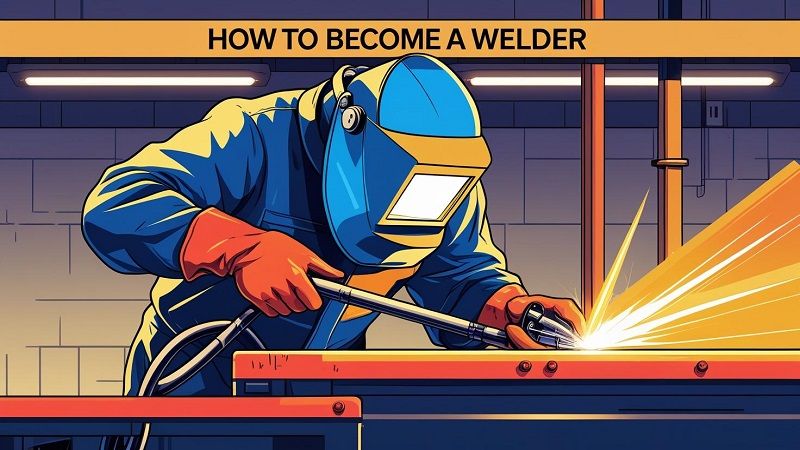First of all, what is the work of a welder? A welder is a person who is skilled in the art of joining two metal parts. Think about it, without a welder, no building is built, no car, bike, train, ship or bridge can be made. Even the grill of a house, gate, pipeline, tower - everything is incomplete without welding.

The work of a welder is as technical as it is fun. Other times a fire, other times underwater, other times on tall buildings, and other times in the noise of a factory. And the job of a welder is not only to connect pieces of metal, but with the rest of the world, too.
Key Skills for a Welder
Now let's talk about the skills that a welder should have. If you have these skills, then you understand that you can make a splash in the world of welding.
1. Understanding welding techniques
There are many types of welding—MIG, TIG, Arc, Gas, Spot, Laser, Plasma—each technique has its own fun and challenge. You should know at least 2-3 welding processes well.
2. Reading blueprints and drawings
The engineer or supervisor will give you a blueprint or design—now you have to understand where to weld, how much gap to keep, which metal it is, how thick it is. If you understand this, then the work becomes half easy.
3. Understanding metal and material
Every metal has its own tantrums—it is easy to join iron, but joining stainless steel or aluminum is a bit tough. Which metal melts at what temperature, which welding rod is for which metal—it is important to know all this.
4. Friendship with machines and tools
Welding machine, cutter, grinder, hammer, vice, clamp—you will have to make friends with all these tools. Machine settings, current, voltage, gas flow – you have to manage all these yourself.
5. Understanding of safety
Welding involves fire, sparks, smoke, gas, noise – everything. Therefore, it is important to use a helmet, gloves, jacket, shoes, mask – all these correctly. A small negligence can lead to a big injury or accident.
6. Focus and patience
There is no room for error in welding. A small mistake can weaken the entire structure. Therefore, develop the habit of focus, patience and working closely.
7. Physical fitness
Many times, you have to stand for hours, lift heavy machines, work in tight spaces. Therefore, it is important to keep the body fit.
8. Teamwork and communication
In big projects, work cannot be done alone. You have to work together with engineers, supervisors, other welders, helpers – everyone. You should know how to speak clearly and at the right time.
Which courses can be done to become a welder? (Courses for Welders)
Now let's talk about where to start to become a welder, which course should be done, and what avenues open up after the course.
1. ITI Welding Course
The most popular and easy way is the welding course of ITI (Industrial Training Institute). This is a 1 or 2 year course, in which you are taught everything from basic to advanced welding, metal identification, machine operation, safety, and practical training. ITI welder's course is available in every district across India.
2. Diploma in Welding Technology
If you have passed 12th (Science), then you can also do Diploma in Welding Technology. This is a 3 year course, in which metallurgy, design, quality control, and management are also taught along with welding.
3. Short Term Certificate Course
Many private institutes and companies offer short-term courses of 3, 6 or 12 months. Specialization is also available in this-like pipe welding, underwater welding, auto welding, etc.
4. International certification
If you want to work abroad, you can get international certifications like AWS (American Welding Society), TWI (UK), or NCCER (USA). These certificates are valid worldwide and their value is very high.
5. Apprenticeship
The best way to learn is to do apprenticeship directly in a factory, workshop, or company. Here you will get real experience while working with a senior welder. Many times the company offers you a permanent job during the apprenticeship itself.
6. Safety and first aid course
Safety is most important in welding. Many institutes also offer short courses in safety and first aid, which will add to the beauty of your resume.
Step-by-Step Plan to Become a Welder
Now suppose, you are 10th pass and want to become a welder. So what do you have to do?
- 10th Pass.
- Take admission in ITI welder course.
- Pay more attention to practical during the course.
- Take tips from senior welder or teacher, do extra practice.
- Do apprenticeship or internship after the course.
- Apply for job from placement cell of ITI or institute.
- If you want to go abroad, do international certificate.
- Keep doing advanced course or specialization along with job.
- Always pay attention to safety, quality and time management.
- With experience, both salary and responsibility will increase.
What is the salary of a welder? (Welder Salary)
Now the most interesting question-how much money will you get? The salary of a welder depends on many factors—where you are working, which industry, how much experience you have, and what certificates you have.
1. Starting Salary
When you are a fresher you can make between Rs 10,000 and Rs 15,000/month after ITI or apprenticeship. It can range between Rs 8000 to Rs 12000 in small towns.
2. With experience
After 2-3 years of experience, the salary reaches Rs 18,000 to Rs 30,000 per month. You can get more in big cities or multinational companies.
3. Specialization or international job
If you have specialized in pipe welding, underwater welding, or automotive welding, then you can get a salary of Rs 40,000 to Rs 80,000 per month. In Gulf, Canada, Australia, Europe, welder's salary can be 1 lakh to 2 lakh rupees per month or even more.
4. Overtime and bonus
Separate money is given for overtime at factory or project site. Bonus is also given on festival or completion of target.
Welder Job Vacancies & Career Growth
1. Where will you get a job?
- Online portal: Thousands of welder jobs are available on placementindia.
- ITI and Institutes: There is a placement cell here, which connects you directly with the companies.
- Direct application in the company: You can apply directly in all these places - construction, automobile, manufacturing, oil and gas, railways, and shipyard.
- Government jobs: Welder vacancies also come out in railways, defense, municipal corporation, PSU.
2. Career Growth
Junior welder - Son of a welder - becomes a good welder - Becomes a man supervisor - Becomes a welding inspector - Becomes a welding engineer
In the course of time, you may work as a trainer or as a quality controller or even start your workshop.
Welder Interview Questions
These questions are usually asked in an interview:
- Which welding techniques have you learned?
- Can you read blueprints or drawings?
- Why is it necessary to use safety gear?
- Have you ever faced any problems while welding? How did you solve it?
- What is the inspection method to study the quality of a welding joint?
- Have you ever worked with a team?
- What designations do you hold?
- What is your industry of interest and why?
- Practice these questions and speak the truth.
Benefits of Becoming a Welder
- Always in demand: Welders are needed in every industry.
- Good earnings: Salary increases with experience and certification.
- Opportunities Abroad: With an international certification, you can get a job abroad as well.
- Career Growth: You can go from junior to supervisor, inspector, or engineer.
- Creativity: You can show your creativity in art, design, and manufacturing.
- Freelancing: If you want, you can open your own workshop or work on a project basis.








ADD COMMENT